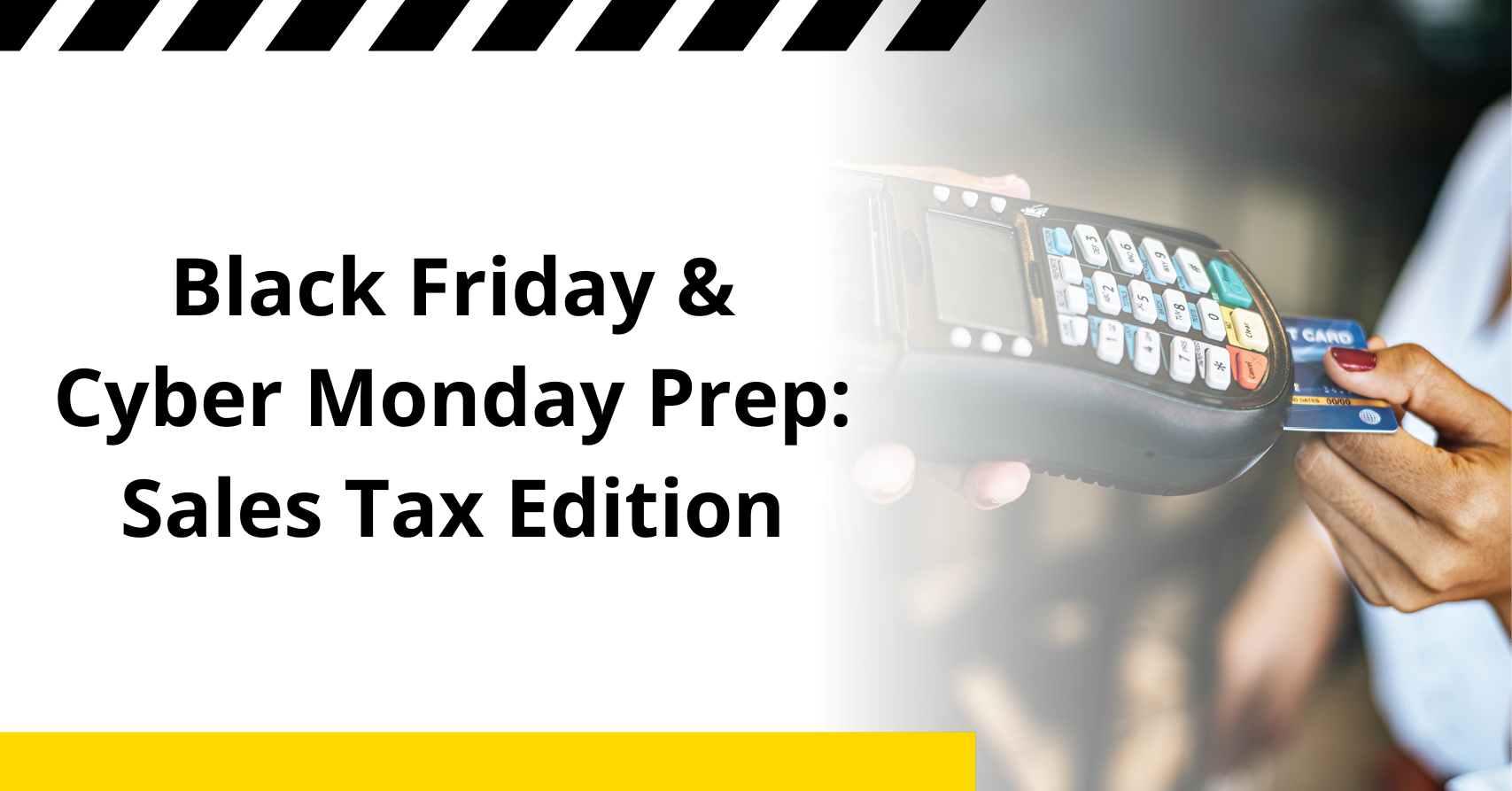This time of year many articles crop up to advise e-commerce sellers on how to prepare for the upcoming selling holidays like Black Friday and Cyber Monday. This good advice is meant to boost your bottom line and help you take advantage of an audience ready to click “Buy Now.” But one thing many of those articles fail to mention is sales tax.
That’s right, if your sales tax is on point in time for the holiday season, then you may find yourself digging into all that extra profit to pay the tax man.
Here’s how to ensure your sales tax collection is prepared for BF/CM so all you need to concentrate on is making sales and fulfilling orders.
Ensure You’re Collecting in All Nexus States on all Sales Channels
A mistake we frequently see is forgetting to set up sales tax collection on all platforms. Maybe you hired a contractor to help with your Shopify store. Having a contractor in a new state gave you nexus in that state. You dutifully registered for a sales tax permit, then began collecting sales tax from buyers in that state.
…But only through your Shopify store.
It’s vital to remember that once you have nexus in a state, you are required to collect sales tax from every buyer in that state, through every channel on which you sell.
Some e-commerce merchants use Black Friday and Cyber Monday as a chance to kickstart a new platform. Perhaps you were an FBA seller who recently moved to Shopify, or are selling and collecting sales tax through an ERP like Salesforce. Just remember to set up sales tax collection for all of your nexus states.
What happens if you forget? You’ll owe the sales tax you didn’t collect out of pocket. This can quickly eat into your profits, especially at a high volume sales time like Black Friday and Cyber Monday.
Recommendation: Take a moment to ensure all of your shopping carts and sales channels are set to collect sales tax in all of your nexus states.
Remember Product Tax Exemptions
Items like food, clothing and digital goods aren’t taxable in every state. Now is the perfect time to look over your sales tax collection and ensure that you aren’t accidentally collecting sales tax on non-taxable items. Or that you’re not neglecting to collect sales tax on items that are only non-taxable in some states.
Here’s a handy guide to product taxability on the most common items:
Also, if you’re planning on selling things like gift baskets that include food (often non-taxable) and other things like coffee mugs (taxable) then ensure you are collecting sales tax correctly on the bundle. Not sure? Contact HOST for a product taxability consultation.
Ensure You’re Collecting the Right Amount
At HOST, we’ve been assisting e-commerce merchants with sales tax for 25 years now. We’ve watched as states got more sophisticated about requiring e-commerce sellers to collect sales tax. And as states began cracking down, shopping carts and marketplaces got savvier in order to help their sellers state compliant.
While some shopping carts like Shopify now have sophisticated sales tax engines that collect the right amount of sales tax in every state, county, city and special taxing jurisdictions, others aren’t always as easy and automated.
We recommend checking that every shopping cart you use is set up correctly. Here’s our primer on how to collect the right amount of sales tax from every buyer in every state.
Check Sales Tax on Shipping
Shipping charges are taxable in most states. That means that if you sell and item then charge money to ship that item to the buyer, that entire transaction is taxable.
However, about one-third of states consider shipping non-taxable if you separately state the shipping charges. States also have their own rules in laws about sales tax on shipping if you sell a mixed shipment–such as a non-taxable fruitcake with a taxable bundt cake pan.
Our guide to shipping taxability tells you which states do, and do not, consider shipping taxable. Double check all your online shopping carts and marketplaces are set to collect (or not collect) sales tax on shipping.
Don’t want to deal with this hassle? Offer free shipping!
Post-Holiday Bonus: Make a Plan for Economic Nexus
Okay so this is more of an “after Black Friday and Cyber Monday” to do, but it’s equally as important.
This is the time of year when your store is liable to cross economic nexus thresholds. And if your business’s sales activity does create economic nexus in a new state, it’s then time to register for a sales tax permit in that state.
The end of the year after the holiday shopping boom is the perfect time to reevaluate your sales and see if you have nexus in any new states. Have questions? Sign up for an Economic Nexus Exposure Analysis from HOST to start your new year off right. We’ll help you determine if you crossed any new nexus threshold. If you have, we’ll get you registered so your business stays compliant and avoids fines and penalties.
Don’t let sales tax derail a successful Black Friday and Cyber Monday. Here’s to a successful and profitable holiday selling season!
